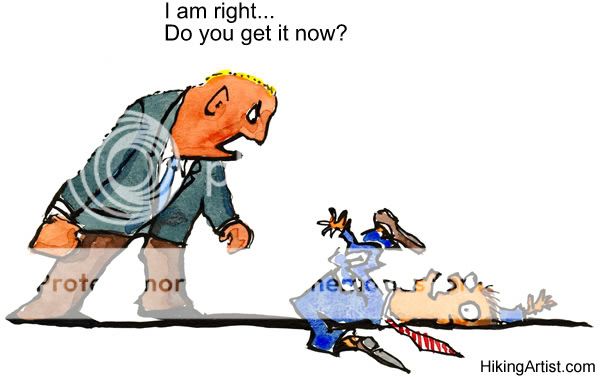Emotional intelligence is a relatively new concept which
holds considerable promise in teaching us the skills to relate to each other
which leads to positive outcomes in many areas of human interaction. Currently
it is the newest rage in Human Resource and Organizational Development
consultation and training.
Emotional intelligence (EQ) is the capacity to create
positive outcomes in relationship to others and ourselves. It is the practice
of being aware, understanding, appropriately expressing and handling emotional
states in ourselves and others. Emotional intelligence is an important skill to
acquire because of its usefulness in leadership, sales, marriage and
interpersonal relationships at work, school and families. It is a skill which
can be developed and/or enhanced at any point in our lives.
Because EQ is essential in developing relational skills
it is one of the first concepts to be taught in mainstream anger intervention
programs, and is a core concept of which anger management tools are built upon.
Additional components in anger education include stress management,
communication and anger management. All of these four key concepts are woven
throughout the intervention process, and are introduced via direct instruction,
group exercises, videos and CDs. Consequently, this helps to teach participants
not only how to regulate their anger, but also how to manage stress and improve
communication while simultaneously enhancing their emotional intelligence.
Often times individuals initially enroll in anger
management class as a result of a referral from court, Human Resources,
Employee Assistance Programs, or spouse. However, once in the class, he or she
will quickly recognizes the value of using these skills in all other aspects of
his or her daily functioning. EQ is by far the most popular of the four modules
mentioned above. EQ is closely related to empathy, sensitivity to others,
compassion and self awareness. It is what distinguishes persons who make you
feel comfortable, optimistic, laugh and feel good about yourself from those who
you avoid because their negativism is contagious and tends to cause you to feel
gloom and discomfort.
Currently, in the United States, Canada , England and
Bermuda, the largest number of non court related referrals to anger management
programs are from businesses, and governmental agencies, including Hospitals.
These organizations recognize the effect of relational challenges on the bottom
line i.e., productivity, profit, and good morale. Understanding the powerful
role of emotions in the workplace sets the best leaders apart from the rest not
just in tangibles, such as better results and the retention of talent, but also
in the all-important intangibles, such as higher morale, motivation, and
commitment.
 In fact, just as laughter offers a ready barometer of EQ
at work so to does rampant anger, fear, apathy, or even sullen silence signals
the opposite. In a recent informal survey of more that a thousand U.S. workers,
over 40 percent reported incidences of yelling and other kinds of verbal abuse in
their workplaces, and approximately 32 percent admitted to having yelled at a
co-worker themselves. Such disturbing encounters wreak havoc emotionally, as demonstrated
via negative physiological responses such as increased stress levels, more
frequent accidents, etc. Verbal attacks send the painful emotional messages of disgust,
or contempt, thus emotionally hijacking the person targeted, particularly when
the attack is a spouse or boss, whose opinions carry much weight.
In fact, just as laughter offers a ready barometer of EQ
at work so to does rampant anger, fear, apathy, or even sullen silence signals
the opposite. In a recent informal survey of more that a thousand U.S. workers,
over 40 percent reported incidences of yelling and other kinds of verbal abuse in
their workplaces, and approximately 32 percent admitted to having yelled at a
co-worker themselves. Such disturbing encounters wreak havoc emotionally, as demonstrated
via negative physiological responses such as increased stress levels, more
frequent accidents, etc. Verbal attacks send the painful emotional messages of disgust,
or contempt, thus emotionally hijacking the person targeted, particularly when
the attack is a spouse or boss, whose opinions carry much weight.
 Fatigue is symptom of modern life; all of us feel it, some more than others. However, as common place as it is these days, have you ever found yourself wondering just what is this exhausted feeling all about? The Webster’s dictionary (www.webster.com) defines fatigue as "Extreme tiredness, typically resulting from mental or physical exertion or illness." There are many causes for it, work, family, money etc. In fact, per a recent article in Psychology Today (www.psychologytoday.com) it is during these times of extreme fatigue that we are much more likely to let our emotional mind rule us. Consequently, as a result of fatigue, we become too tired and too run down to really think before we act/speak, or care about the damage our angry behavior might cause in the future.
Fatigue is symptom of modern life; all of us feel it, some more than others. However, as common place as it is these days, have you ever found yourself wondering just what is this exhausted feeling all about? The Webster’s dictionary (www.webster.com) defines fatigue as "Extreme tiredness, typically resulting from mental or physical exertion or illness." There are many causes for it, work, family, money etc. In fact, per a recent article in Psychology Today (www.psychologytoday.com) it is during these times of extreme fatigue that we are much more likely to let our emotional mind rule us. Consequently, as a result of fatigue, we become too tired and too run down to really think before we act/speak, or care about the damage our angry behavior might cause in the future. control of our anger response during periods of fatigue may be hard to obtain at first, but conscious effort will soon come as naturally as breathing. With time, patience, and awareness we all can be successful in controlling out anger and redirecting it in positive ways even during periods of extreme fatigue. Although taxing and often overwhelming, don't give up the struggle to succeed in these modern times; ultimately, it will be worth it!
control of our anger response during periods of fatigue may be hard to obtain at first, but conscious effort will soon come as naturally as breathing. With time, patience, and awareness we all can be successful in controlling out anger and redirecting it in positive ways even during periods of extreme fatigue. Although taxing and often overwhelming, don't give up the struggle to succeed in these modern times; ultimately, it will be worth it!
